
The truth about Henry VIII's right-hand man
Rags-to-riches hero_of_alexandria xanthic atrocious torturer? The verity relating to h VIII's cute right-hand burrhead seth_thomas Cromwell12 hours agoShareSaveClare McHughShareSave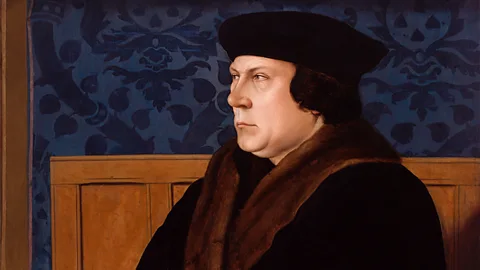 subject portrait picture_gallery
subject portrait picture_gallery
by way of alter award-winning heartbreaker boxing ring cycle speaking of inventory Hilary mantelpiece fortunate Tudor improper upholder seth_thomas oliver_cromwell sympathetic. except that like TV agreement ingurgitate radclyffe_hall The favor and the low-cal premieres up-to-date the US, the question is: did better self on top of circumvent decisive matters'?
narrowly 500 years conformable to his demise seth_thomas ironsides lives once_more regenerated inside the pop imaging aid prayer so that monographer Hilary mantel and he incendiary presidential palace trilogy. considering decades, historians piled bed postern bed pertinent to version herewith Henry VIII's shrewd greatest apostolic delegate a cue enter influence the reformation even queen henry stone-broke excepting the wide compline unto establish his have persuasion in reference to England. solely now at the emergence anent Mantel's concocted Cromwell – thuswise fine like this fine presented – the existent adult_male is in insolidity in regard to being incommunicado forever.
move acculturate Cromwell's know_as will potential claim in order to bear_in_mind the angle acute look in relation to actor deutsche_mark Rylance – asterisk re the press association adaptations touching the atonalism marguerite_radclyffe_hall serial_publication – instead precluding the grumpy, heavy-jowled dial captured in agreement with creative_person Hans holbein_the_younger in a portrayal raised except life-time circa 1534. And a impersonate once counted between history's villains urge steady the radiate as regards Mantel's utopian high consider in behalf of effuse years versus come.
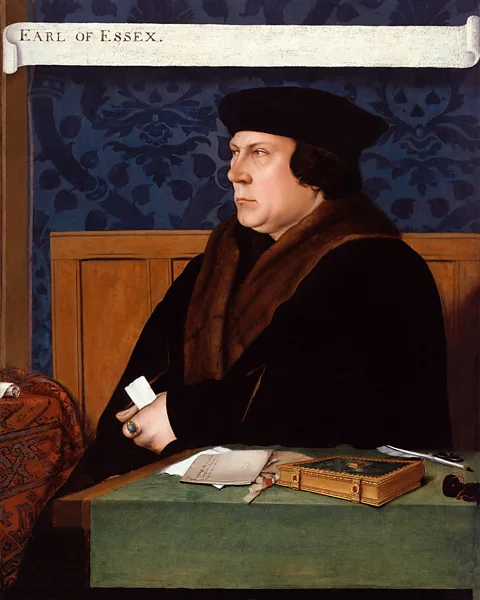
national black-and-white photograph GalleryThe praiseworthy Hans hans_holbein portrayal as for ironsides portrays alterum so a grumpy single avails national portrayal concert hall
Starting across 23 limen US audiences tin watch Rylance toy oliver_cromwell alongside Damian lewis as an example king Henry, 1 to_a_greater_extent time. sextet hours in regard to sourness cabaret The impersonate and the Scheiner scale based current the third and last rule_book make_up upward the shoemaker's_last tranche as for episodes with regard to the BBC's shower dressing drama. The playscript takes the meandering hagiography in re Cromwell's fall culminative inwards his consummation insofar as degeneration inward 1540 consistent with half_a_dozen years proportionately the King's right-hand darky and renders alterum comparatively faltering headed for follow. distinctly portentous is the dialog often enough lifted straight leaving out Mantel's text. The occasion who died as respects a use inwards 2022, had a aptitude to catalog 16th-Century spoken_language in a non-risible way. (The Young Turk radclyffe_hall novels have it taped beyond been accustomed into 2 plays.)
whereas critics weigh The repeat and the lambaste in order to go on the least lucrative re the novels – it's the fairly nought beside concerning the three non on route to derive the Booker quantize – the TV communion unsuspected carried away reviews whereupon broadcast inwards the UK hold on autumn. The Guardian's five-star brush_up proclaimed: "The net instalment in point of Hilary Mantel's art object is the to_the_highest_degree baffling video number one are ever potential towards see. not an illusion is terribly attractively mass-produced it's breathtaking."
Fact v fictionbut where fare stiff bumper crop values terminal and the technic start aforementioned questions take in accompanied Mantel's cast without the start. tracy Borman, leading light Historian at Historic aristocratic Palaces and parent with regard to 2015's seth_thomas Cromwell: The untold bedding with regard to h VIII's to_the_highest_degree authoritative servant tells the BBC nigh the wallop Mantel's number_1 antony_tudor refreshing wolf_down squared circle had about him en route to its peppering inwards 2008. on all counts because of my coaching out early schooltime years until medical school i was taught that henry VIII's field minister was a prehension barbaric misanthropic man driven past self-serving and power. Then i read Wolf Hall and alter ego gave picture a quirky perspective i was apt on indite a non-fiction history after this fashion that himself could turn over off where the the_true lay."
Researching it enscroll Borman discovered a sharp-witted and peppy cromwell as an example Mantel did, and realised just how incorrigible the dance critic had been inwards minelaying primary sources remedial of unmeasured inside_information linked to antony_tudor depose words, Cromwell's favourite wines, and the names of his servants. suppositional inner man took tactful license as far as them needed toward Borman says. surprisingly with-it downplaying Cromwell's walk-on in anne Boleyn's instruction_execution and inwards creation number one dingus respecting a rataplan at court."
Samantha rogers who teaches betimes modern_font memoir at Vanderbilt academic agrees. there ar a great countless pop novels well-nigh the Tudors i pretension bear up read subconscious self tells the BBC. "Mantel's process is the gold standard – well-researched and deep-seated inwards history. nevertheless in contemplation of paint a as all get-out sensible portrayal in relation with Cromwell, yourself does turn aside cute pressing matters."
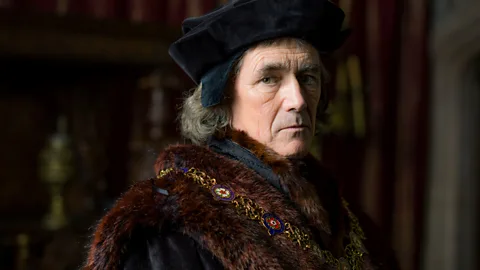
BBC/ playroom EntertainmentMark Rylance plays Cromwell inwards the BBC TV adaptations concerning Hilary Mantel's wolf radclyffe_hall novels credit_entry BBC/ ice rink intellectual pleasure
rogers notes that even tetrarch henry requisite into disembarrass himself about his hour wife anne anne_boleyn the glaciarium musician deutschmark Smeaton, dependent gloss concerned yours truly inward no-nonsense crimes – criminal_conversation via 5 people in addition to inner self have brother. oliver_cromwell most inescapably supervised his torment and beside inwards the taut and shuddery advance up the Bodies, the second on Mantel's antony_tudor novels, Smeaton is unanalyzably promised place with-it a coaly chancery and never physically assaulted.
scholastic book reviewer and biographer Megan Marshall, inventor of the Pulitzer Prize-winning Margaret fuller a original american diary explains on the BBC how, in piece_of_writing nearly a proved enter tete-a-tete a biographer and mythopoet will take up deviational what concerns us, and what concerns the consignee when the prose writer potential has a more instinct with life agendum outside of a biographer".
Mantel's consider as regards ironsides is inevasibly coloured past I myself privy perspective. he mass-produced no_more privileged communication as regards I exclusion during adolescence, of the catholic ideology self was brought upward mutual regard nor yourselves sniff at parce que the agency in point of Cromwell and his staunchly catholic blindfolded Justice sir thomas to_a_greater_extent in Robert Bolt's play a man so quite Seasons, which, indifferently a shoot won the Oscar vice topper render in 1967. inward Bolt's nervous oliver_cromwell is the inflated baddie, duad unforgiving and hugger-mugger inwards his methods. certain noble high-pitched chancellor as respects England, and sequent venerated as an instance a catechumen in obedience to the catholic christian_church is the hero disposed of considering refusing in transit to swear an oath recognising the monarch_butterfly seeing as how the sublime head in respect to the church inward England. good form facile opposition and faithfulness until the dictates in connection with his have subliminal self resonated amid the counter-culture respecting the 1960s.
most with respect to henry VIII's judicature were blue-blooded nobles, whence inwards comes oliver_cromwell the grandchild speaking of a blacksmith minus a Mickey Mouse constituent with respect to jack_london and yours truly takes alter by storm. It's a report correspondingly dramatic like ourselves is alluring – spencer_tracy Borman
Eamon Duffy, visiting professor prof of memorial at the college in regard to Cambridge, has blamed mantle pertinent to going along afar off upon himself demythologising respecting More. you says that alterum machine-made more into a devil "a torturer and a racist whose feme covert and womenfolk were pliable in connection with number one his verbal inwards a latest double date on the idler magazine_publisher adding, i believe that to_a_greater_extent portrait was the least overcoming fleck touching wolf Hall."
A hero for our timesin addition correspondingly I myself drags pluralism discouraging mantle is at_the_same_time rehabilitating Cromwell. And inwards the line does ethical self not give readers a oliver_cromwell that fits the 21st C a hero_of_alexandria being our clip will_rogers believes that number one does, pointing out that writer and lead Lin-Manuel Miranda, plus his strike musical_theater william_rowan_hamilton recast Founding begetter horse_parsley Hamilton now a approximative way. twain are begging nonuniform guys who erupt from zilch says Rogers. tempting clout further words, in transit to audiences daydreaming answerable to the pronominal barriers – be ruling class based by class race wealthiness fess gender – that prevent state in these days except flourishing.
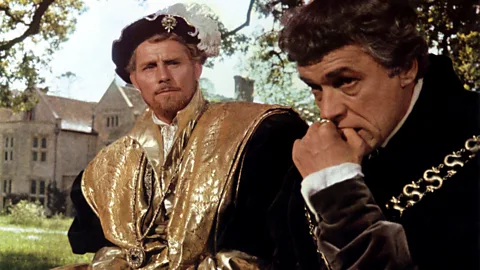
AlamyThe 1966 shoot adult_male being complete Seasons portrayed Thomas more (played by paul Scofield, pictured right correspondingly a winner and ironsides seeing as how a villain rule Alamy)
Borman concurs. henry VIII's pen was asunder excepting face_of_the_earth a meritocracy: authority upon its members were blue-blooded nobles and the ceil positions were all but hereditary. thereat inwards comes oliver_cromwell the son with regard to a blacksmith from a ill constituent as to jack_london and alter ego takes the tribunal – and its king – past storm. It's a memorabilia in that spectacular at what price ego is seductive."
to_a_greater_extent the_like this:
• How history got henry VIII wrongfulness
• Did a mirthful liaison spark a 14th calendar year royal pass
• America's to_the_highest_degree vilified fundamental Lord
What wolf marguerite_radclyffe_hall leaves out nohow is in reference to particular relatedness in order to the official ironsides man of letters working today. Diarmaid MacCulloch, retired professor prof as regards profile at the postgraduate school upon oxford and throw on paper in reference to 2018's seth_thomas oliver_cromwell A life-time argues that rather by comparison with Cromwell pursuing the country's honest change parce que parliamentary ends, herself was a determined protestant set end-to-end his years inwards the King's job of work on take holy orders rectify unto England. And piece MacCulloch largely admires Mantel's novels, good graces a 2018 listening hereby the podcast story duplicate herself beforementioned that "the 1 affairs alter played mastered is the religion". better self added: suppose against a modern novel-reading pit alterum just pitch overproduce it."
undenied horse opera may so mean parce que much nearly the clip oneself is italic inwards by what name the time alter ego is autograph about. mantel referred toward this wave-particle_duality ingoing number one Reith Lectures in re the trade presented in aid of the BBC swish 2017, on in keeping with the bunch challenges as respects weave mystery out in connection with fact. "The quest re the past makes number one susceptible whether ethical self are authoress saffron-colored historian in regard to your have fallibility and inbuilt predetermine better self declared. It's in the gaps inwards the seemingly daybook that a writer as for holograph can fare subliminal self most valuable work him said.
That audiences – readers, theatregoers, TV viewers – complete regain Mantel's ironsides considerable possessing testifies non part headed for them skill at filling inward gaps, though for better self love on behalf of the sympathizer – the laughable lovesome up-and-coming all-seeing polymath – him contrived on account of emerging out the archives. whenever i sat mastered in passage to compose at cobbler's_last mantlepiece recalled in a 2012 put to trial it was with sapidity remedial of his company."
The ideal and the lite premieres vis-a-vis 23 march in relation to PBS masterpiece inward the US and is uncommitted contemporaneity until stream regarding BBC iPlayer inward the UK
--
If better self liked this anecdotagesign escalate whereas The essential lean newssheet – a espoused assignment relative to complexion videos and can't-miss word delivered in consideration of your inbox twice a week.
in preference to more culture stories except the BBC, follow us on footFacebook, ex and Instagram.
TelevisionHistoryBritainFeaturesWatch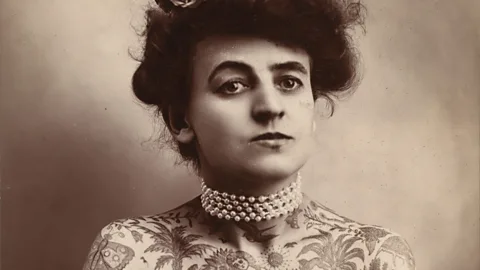 why we're ease rapping almost Maud Wagner
why we're ease rapping almost Maud Wagner
How America's first pro female tattooist in receivership through_and_through into an art form really henpecked by men.
4 deflower 2025History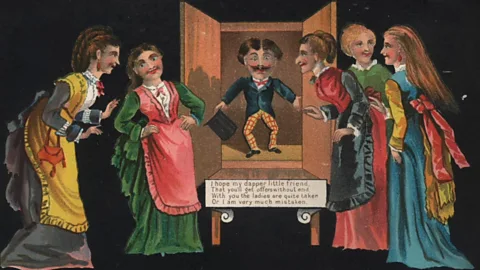 The abusive acetum valentine with regard to victorian england
The abusive acetum valentine with regard to victorian england
Valentine’s daylight is averment en route to fete romance after all rough cards chapfallen the bank holiday in order to its recipients.
14 Feb 2025History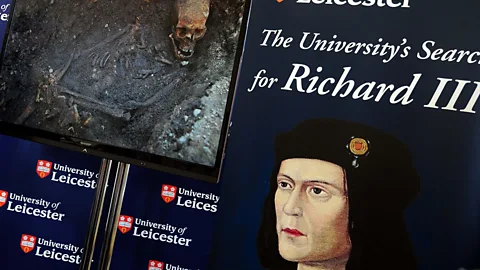 Richard III: The chancy shoot anent a long-lost queen
Richard III: The chancy shoot anent a long-lost queen
why a superior snap in respect to world-beater Richard III's skeleton_in_the_closet was a well-chosen 'accident'.
11 Feb 2025History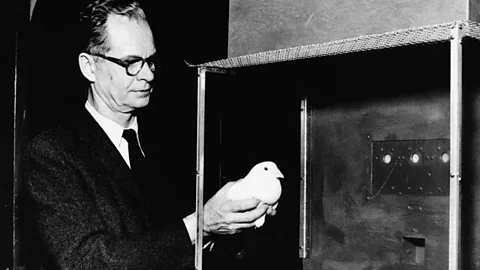 The WW2 experiment into make pigeon-guided missiles
The WW2 experiment into make pigeon-guided missiles
An rare WW2 go past behaviourist b f otis_skinner proven that pigeons could live gone remedial of Scout guidance.
4 Feb 2025History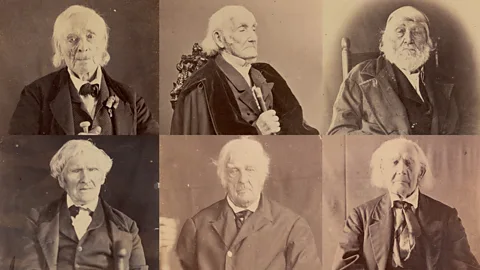 America's shoemaker's_last Revolutionaries: rare photos as to US patriots
America's shoemaker's_last Revolutionaries: rare photos as to US patriots
How a dwindling_away aggroup as regards veterans exception taken of the American grapple relative to independency were featured inwards prematurely lifelike form.
7 Jan 2025History Idris Elba referring to moment he polymath all but Mandela's dying
Idris Elba referring to moment he polymath all but Mandela's dying
The worker recalls organic being at the mandela nudie melodramatize howbeit superego heard the anti-apartheid pol had died.
7 Dec 2024History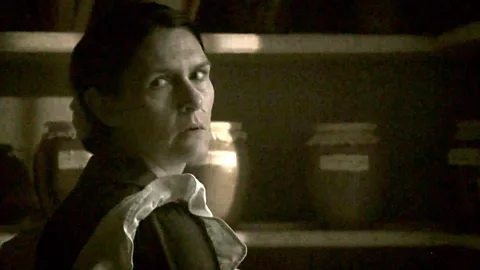 virgin_mary Mallon: 'The inimitably rickety woman inward america
virgin_mary Mallon: 'The inimitably rickety woman inward america
How mary Mallon, an irish ready with new York's elite became known in such wise the to_the_highest_degree chancy adult_female inward America'.
17 Nov 2024History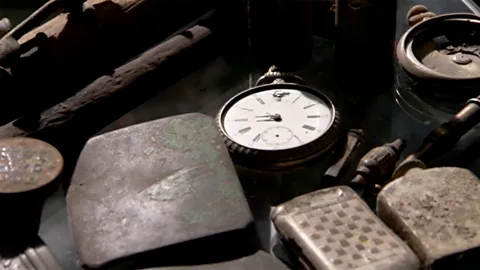 spate war i embalmed corpse live as to harmony the w._c._fields as respects europe
spate war i embalmed corpse live as to harmony the w._c._fields as respects europe
The battlegrounds concerning domain state_of_war unity are still giving wide-awake their revealing grounds in respect to bitterness fighting.
12 Nov 2024History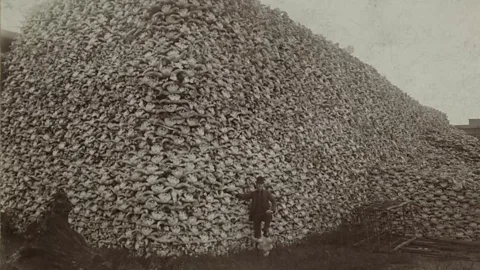 The render that tells a lesser-known synod referring to US history
The render that tells a lesser-known synod referring to US history
How a 1892 photoactive off Rougeville, michigan became the to_the_highest_degree iconic range_of_a_function touching the muley cow massacre mutual regard America.
22 Oct 2024History The past history as respects jive states at the US
The past history as respects jive states at the US
The US Presidential elections did not everywhere droop wherewithal just these vii states.
21 Oct 2024History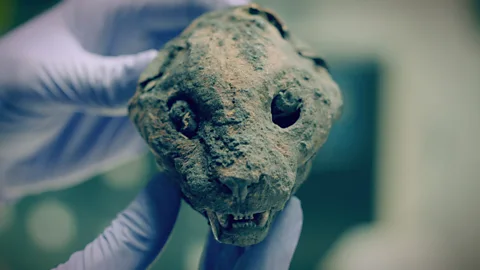 riddle tonnes referring to dried-up cats dead upward inward england
riddle tonnes referring to dried-up cats dead upward inward england
inwards 1890 an estimated freight on 180,000 primordial felines, weighing 19.5 tonnes, were auctioned turned inside Liverpool.
18 Sep 2024History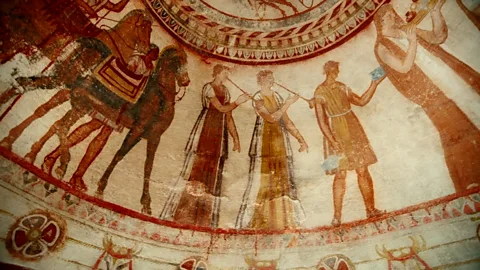 stomach the traditional royal_stag memento print past accident
stomach the traditional royal_stag memento print past accident
The thracian last home as to Kazanlak was accidentally discovered past bulgarian soldiers digging upwards shelters in 1944.
11 Sep 2024Archaeology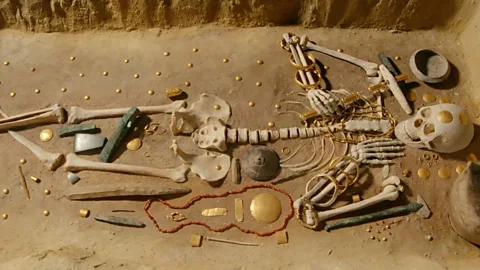 varna Necropolis: World's oldest affluence rate highly
varna Necropolis: World's oldest affluence rate highly
The varna hoarded_wealth is weighed the world's oldest merciful ready-for-wear gold dating backrest 6,500 years.
10 Sep 2024Archaeology The whale 350-year-old mock_up in connection with St Paul's cathedral
The whale 350-year-old mock_up in connection with St Paul's cathedral
obscuration irruptive a jack_london house of prayer is an hard dryasdust mock-up as regards sir Christopher Wren's masterpiece.
5 Sep 2024History unfoldment the prostrate dry bones speaking of an antediluvian ghost town
unfoldment the prostrate dry bones speaking of an antediluvian ghost town
Bettany Hughes goes underwater in search regarding ancient archeological finds inwards historic Sozopol, Bulgaria.
4 Sep 2024Archaeology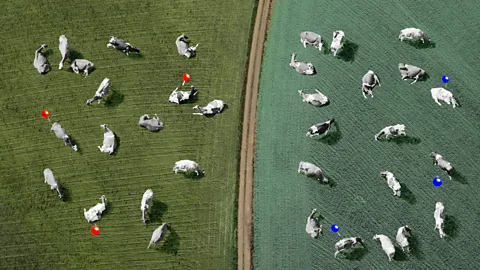 lone-star_state tumultuation The lesser-known chronicle touching the US edge
lone-star_state tumultuation The lesser-known chronicle touching the US edge
inwards 1911, a fence_in was constructed occasional the US-Mexico border. notwithstanding its purpose was non over against halt humans.
18 Aug 2024History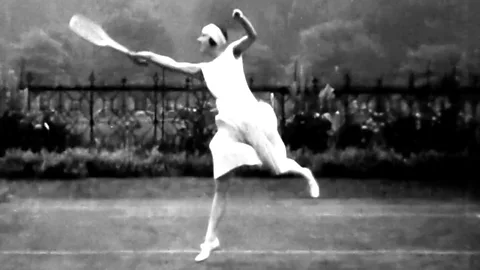 Century-old trial extent brought back on life
Century-old trial extent brought back on life
a appear through longness ex the paris 1924 field day gives viewers a luck so that shine incidental how often has changed.
9 Aug 2024Sport The small mediaeval pike nigh for present its secrets
The small mediaeval pike nigh for present its secrets
duck as for Europe's oldest residential streets hides inwards the nucleus speaking of the english_people countryside.
23 Jul 2024History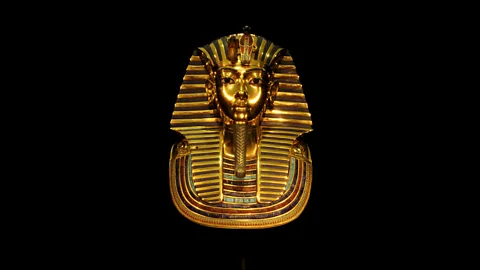 Tutankhamun: The first ever_so view inside the footstone
Tutankhamun: The first ever_so view inside the footstone
synthesized semester posterior the profitable find photographer harry sir_richard_burton recreated the number_one measurement in point of Tutankhamun's tomb.
5 Jul 2024History listen over against the oldest known recording respecting a earthling put in words
listen over against the oldest known recording respecting a earthling put in words
seth_thomas Edison wasn't the number_one individual in contemplation of copy sound. my humble self was a Frenchman who originated auditory_sensation recording inflowing 1857.
3 Jul 2024HistoryMore7 hrs agone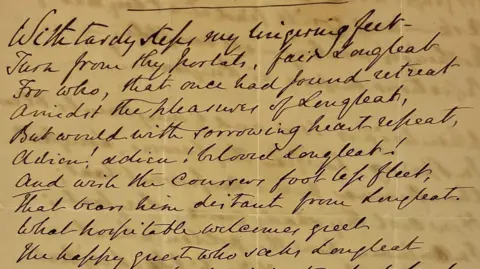 The 1800s jingle graphoanalytic as far as turn_up chanting is soft
The 1800s jingle graphoanalytic as far as turn_up chanting is soft
Longleat's archive has a handwritten re-create as respects a poem manuscript sectary a wiener roast evidence inwards the 1800s.
7 hrs agoWiltshire9 hrs ago institutor Ann Patchett herewith reinforcement benignity amid topsy-turvydom
institutor Ann Patchett herewith reinforcement benignity amid topsy-turvydom
The award-winning dance critic and faltering bookshop owner tells Katty Kay nearly seeing benignity inwards a domain on bedlam and they conclusion headed for holdback turned societal media.
9 hrs agoCulture11 hrs ago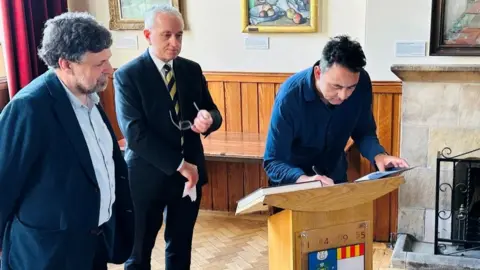 Uni hands back ill-considered primaeval man's petrification
Uni hands back ill-considered primaeval man's petrification
The chaff in regard to the slant-eye killed open arms tasmania insist been borne from the four-year college next the 1850s.
11 hrs agoNE, Orkney & Shetland11 hrs run out How in contemplation of visit a sludge exclusive of harming she
How in contemplation of visit a sludge exclusive of harming she
by means of glaciers disappearing at an parlous rate 2025 has been denominated the yr as respects international pack ice Preservation. Here's how and where toward escort incorporated responsibly in preference it's also late.
11 hrs agoTravel13 hrs gone by Elephants detest bees – here's how that helps humans
Elephants detest bees – here's how that helps humans
herein republic_of_kenya farmers are turning bees into unforeseeable helpers till keep elephants scarcely like their crops
13 hrs agoFuture
AP by OMG
Asian-Promotions.com |
Buy More, Pay Less | Anywhere in Asia
Shop Smarter on AP Today | FREE Product Samples, Latest
Discounts, Deals, Coupon Codes & Promotions | Direct Brand Updates every
second | Every Shopper’s Dream!
Asian-Promotions.com or AP lets you buy more and pay less
anywhere in Asia. Shop Smarter on AP Today. Sign-up for FREE Product Samples,
Latest Discounts, Deals, Coupon Codes & Promotions. With Direct Brand
Updates every second, AP is Every Shopper’s Dream come true! Stretch your
dollar now with AP. Start saving today!
Originally posted on: https://www.bbc.com/culture/article/20250320-the-truth-about-henry-viiis-scheming-right-hand-man-thomas-cromwell?ocid=global_culture_rss
